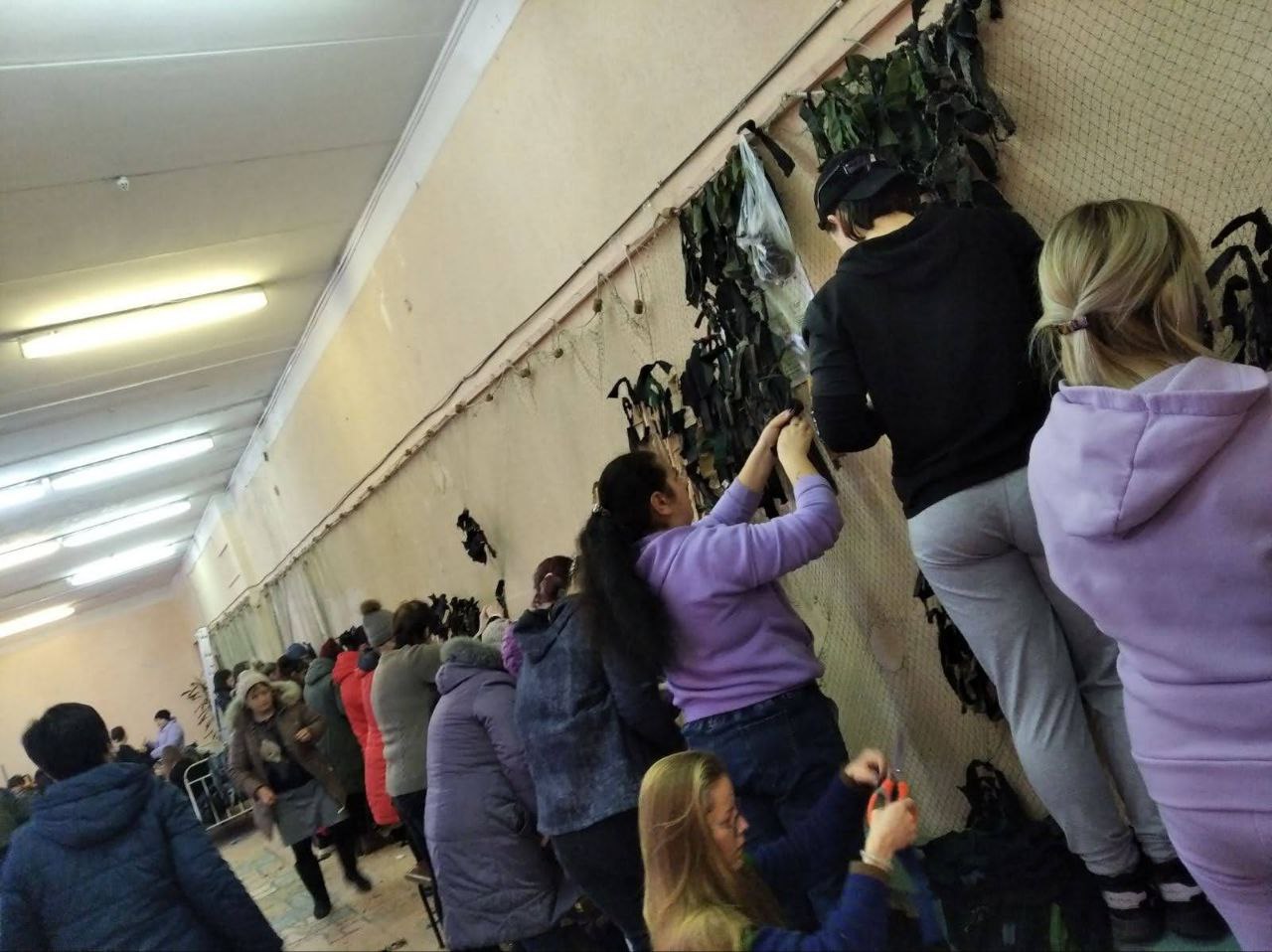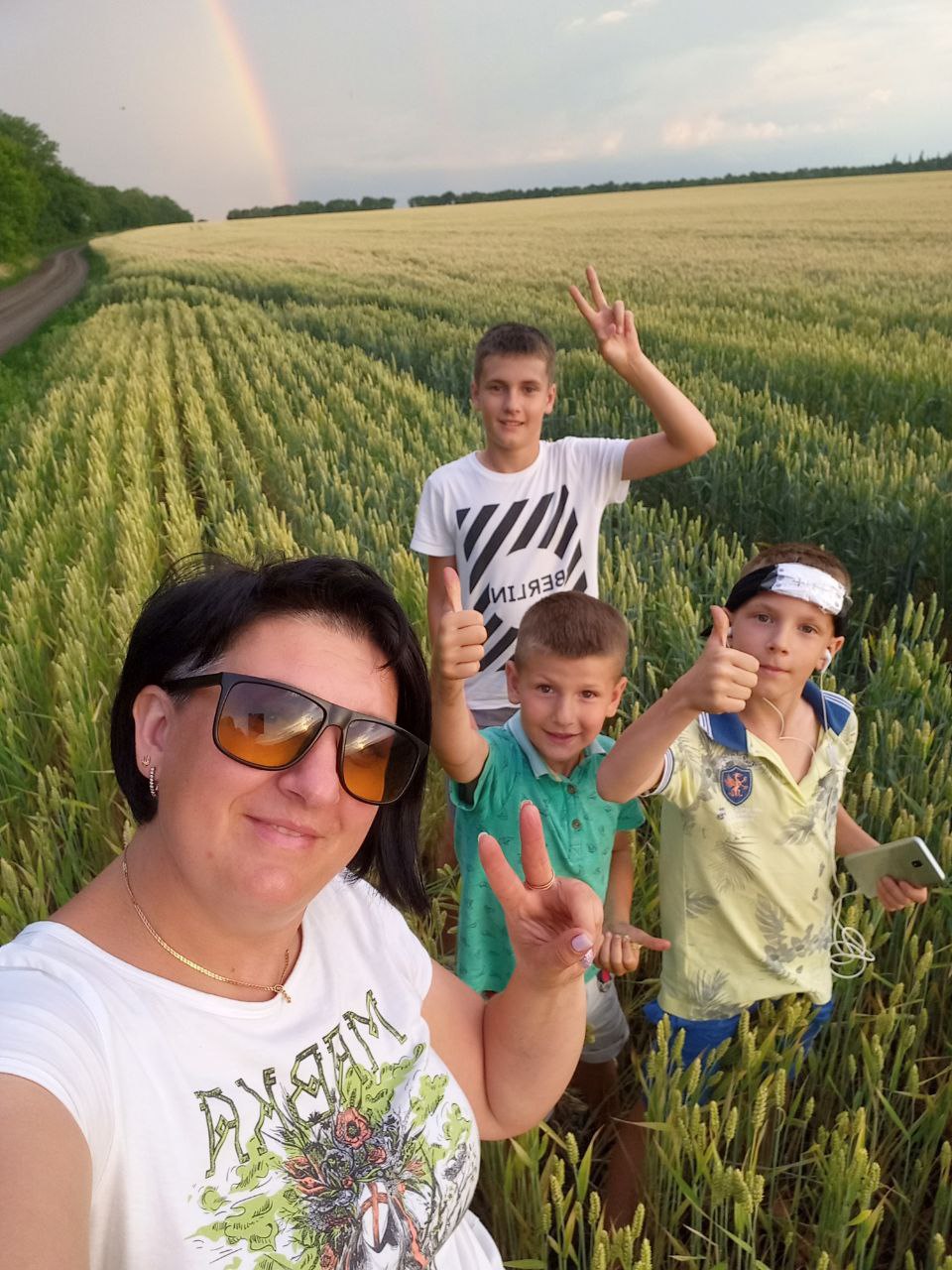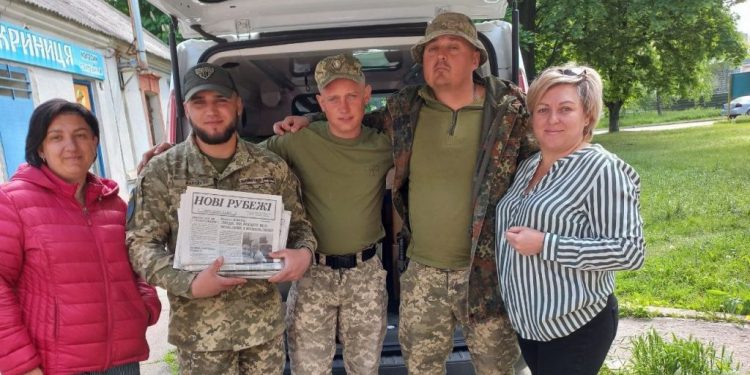They lit candles, said prayers, and wove camouflage nets – these were the first weeks of the war for journalist Nataliya Dolhikh and her family at the publication “Novi Rubezhi” [New Frontiers] in Krynychky, Dnipropetrovsk Oblast. At the onset of the war, the editorial team couldn’t print several issues of the newspaper but continued their work online. From her shelter, Nataliya promptly informed her readers through social media. She shared with the National Union of Journalists of Ukraine how she managed to combine work and caring for her three children in extremely challenging conditions.
“I understood that something very terrible was happening, and it was essential to inform people about it.”
Like most Ukrainians, Nataliya learned about the start of the war from the news. Starting the day by scrolling through the newsfeed was a routine task for a media professional. However, the news was unusual: in every headline, in every piece of information, there was the word “war.”
— At around seven o’clock, I went out onto the street, and my neighbor called me, saying that everyone was heading to gas stations to fill up their cars. I decided that I should do the same, took my car out of the garage, and drove to the gas station. There weren’t many cars there yet. I met fellow villagers in line, and we started discussing the situation. We also met the head of the town, and I inquired about what I should tell the people. Because it was clear that everyone on social media was expecting some reaction from the authorities. He called a meeting, and by 9 o’clock in the morning, I was there with my laptop, — Nataliya recalls.
At that moment, the head asked her to address the people online through the “Novi Rubezhi” publication’s page.
— He knew that he had to reassure people as much as possible, — says Nataliya. — He asked entrepreneurs and farmers to fuel buses so that they could evacuate people if needed. On the first day of the war, everyone tried to work in an organized manner, without panic, although inside, fear and uncertainty trembled. “What’s next?” was the question on everyone’s mind. You know, in the first three weeks, tears just flowed from my eyes – on their own. Because I understood that something very terrible was happening, and it needed to be told to people.
“That was the first stage of calming down – lighting a candle and saying a prayer.”
As scared as Nataliya was, she didn’t dare to leave her hometown of Krynychky. As a mother of three young children, she knew that the journey would be very challenging for them. Some of her friends had left with their children, and they described the harrowing journey they faced. This made Nataliya hesitate. She thought that their town had no strategic importance, so it might not be as dangerous for them.
The family came together. Nataliya worked with information on the internet, and her mother, the chief editor of the “Novi Rubezhi” newspaper, took care of the grandchildren and household chores. But as air sirens became more frequent, they had to hide their frightened children in the basement.
— Parents moved in with me, and my mother was always with the children. Even though we knew what war was like because the children’s father had been at war since 2014, in the first few days, the sons were in shock, especially the younger ones – they were very frightened. One day, I asked my son, ‘Ostap, do you know the Lord’s Prayer?’ And he said, ‘Yes, I do.’ And that was the first stage of calming down – lighting a candle and saying a prayer. Because in the first few weeks, we had to go down to the basement probably three or four times a day. There, we set up our spaces, lit candles, and read stories and prayers. And it made us feel calmer.
Nataliya admits that her family was not particularly religious, but during those anxious February days, prayer was their refuge. One of her sons found a prayer for Ukraine, and their entire family read it together.
— It was tough for the kids, especially when they saw many cars with the word ‘Children’ written on them. They asked why we weren’t leaving. I replied that if there was a need, if it became impossible to stay, then we would leave, — adds the journalist.
“We wove 2 to 3 nets a day and gave them to volunteers who distributed them at checkpoints and to military units in the region.”
Another lifeline for Nataliya at the beginning of the war was volunteering. Alongside the editorial office, there was a social room where people brought supplies for less fortunate families. So when displaced persons began arriving in Krynychky, Nataliya and other volunteers collected and distributed clothing in good condition, using old clothes to make camouflage nets.

— We cut up old clothes, and local fishermen started bringing their nets. Within a day or two, the scale of the work increased significantly. We felt cramped, so we moved from the social room to the House of Culture. We announced it in chat groups, and the next day we were surprised by how many people came to help – teachers from both of our schools and young people. We wove 2 to 3 nets a day and gave them to volunteers who distributed them at checkpoints and to military units in the region. Then we added ‘kikimors’ [camouflage suits] to our work. It’s very labor-intensive. We collected bags, pulled out threads from them, and worked, — the journalist recalls.
“In April, we resumed printing the newspaper, even though, at that time, many editorial offices had closed.”
Meanwhile, the war continued to engulf more Ukrainian cities and villages. There were mass shelling in Zaporizhzhia and Kharkiv regions. The printing of the “Novi Rubezhi” newspaper was suspended, but Nataliya continued to inform people. She understood that the information vacuum was causing panic among the population.
— We tried to inform people on our Facebook page because it was faster. We also worked on the website, but it wasn’t always possible to publish news there because, in the first days, everyone was hiding in shelters, and it was not easy to work with a laptop in a cellar or basement. On social media, we mostly access it through our phones,— Nataliya explains.
However, readers had become so accustomed to receiving the printed version of “Novi Rubezhi,” and they were so reluctant to believe in a full-scale war that in late February and early March, they called Nataliya asking: “When will our newspaper be back?”
— We missed four issues, but then we started looking for ways to continue on paper. Setting up logistics was very difficult. We decided to print in Dnipro because we used to print in Vinnytsia. The print quality was lower, but there was no other option. In April, we resumed printing the newspaper, even though, at that time, many editorial offices had closed. And from June, we fully restored the newspaper’s volume, and we’ve been publishing without interruptions, — Nataliya joyfully reports.
Of course, the content of the newspaper has changed significantly.
— We mainly publish useful information. In the first months, when we resumed the printed version, we explained to people in the newspaper why certain objects should not be photographed, why such photos should not be posted on social media, and how to behave during the dark hours, and so on, — the journalist says. — We write about our local volunteers – in every village, there are people who do a lot for the front line. Women cook day and night and find ways to raise money for food. Others make trench candles. We write about it. We write stories about heroes, about displaced people – everything that is close to people.

“So, we plan not to abandon our cause. A subscription campaign for 2023 has even started.”
Right now, Nataliya is confident in two things: that Ukraine will win and that they will manage to keep the “Novi Rubezhi” newspaper alive. However difficult it may be, she is certain that they will endure.
— We were lucky that we were on the right bank of the Dnipro River, and, honestly, nothing ‘flew over’ to us so far. So, we plan not to abandon our cause. A subscription campaign for 2023 has even started, — the journalist optimistically notes. — We announced to our readers that the subscription price would not change, although it severely impacts our budget. But we will hold on for as long as we can. We believe in victory – if we didn’t believe, we wouldn’t be here working.
This series, titled Executed Free Speech, is created as part of a project Drawing Ukrainian And International Audience’s Attention To Serious Violations Of Human Rights And Crimes Against Journalists And Mass Media By The Russian Federation, which is performed by the National Union of Journalists of Ukraine, with support from the Swedish non-profit organization Civil Rights Defenders.
JOURNALISTS ARE IMPORTANT. Stories of Life and Work in Conditions of War is a cycle of materials prepared by the team of the NUJU with the support of the Swedish human rights organization Civil Rights Defenders.
#CRD

 THE NATIONAL UNION OF
JOURNALISTS OF UKRAINE
THE NATIONAL UNION OF
JOURNALISTS OF UKRAINE
















Discussion about this post